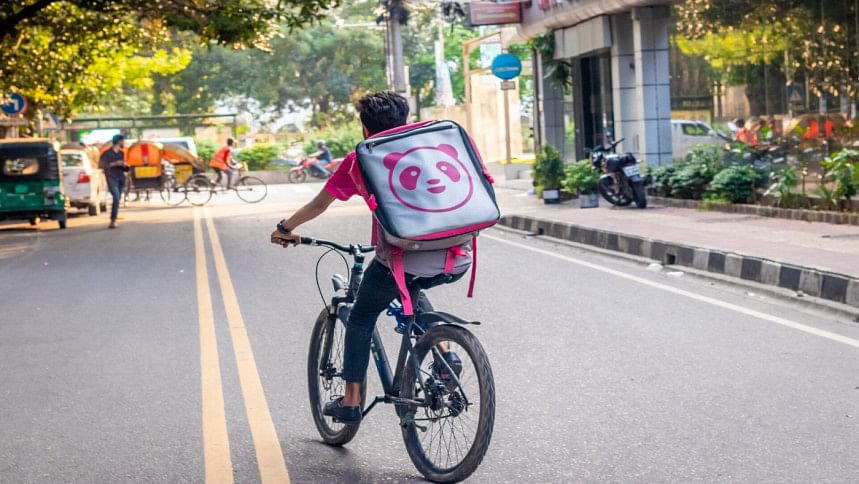Foodpanda here for the long term

Foodpanda and its parent company Delivery Hero maintain an unwavering commitment to the Bangladeshi market, driven by the immense growth opportunity it presents, said Zubair BA Siddiky, co-founder and managing director of Foodpanda Bangladesh.
"Not only to Bangladesh, Delivery Hero has such commitment to all similar markets. And unit economics is also strong in Bangladesh," Siddiky said.
He also dismissed rumours that Foodpanda would cease operations in Bangladesh amid the potential sale of its activities under the Foodpanda brand in selected markets in Southeast Asia, saying: "Foodpanda is here to stay for long term."
Uncertainty grew over the future of Foodpanda Bangladesh in September when Delivery Hero confirmed negotiations regarding a potential sale of businesses under its Foodpanda brand in Singapore, Malaysia, the Philippines, Thailand, Cambodia, Myanmar and Laos in a disclosure.
According to Siddiky, it is common for Delivery Hero to engage in the buying and selling of operations in different markets every year. Typically, such negotiations and deals do not become public before their finalisation.
However, this time, the information was made public through the media. Some news outlets approached the company regarding these negotiations and the company acknowledged them.

As a publicly-listed company, Delivery Hero disclosed the information on its website to avoid potential regulatory scrutiny for sharing price-sensitive news selectively with specific news outlets.
"Notably, five Asian markets -- South Korea, Taiwan, Hong Kong, Bangladesh, and Pakistan -- were not specified in this disclosure," Siddiky said.
"So, in general, these five markets are not under discussion. However, some individuals have approached me expressing concerns about the possibility of operations in Bangladesh closing down. It's important for them to comprehend that Delivery Hero operates in a total of 70 markets, and closure in a few markets does not mean a shutdown of other operations."
He also addressed the losses of 24.22 million euros incurred by Foodpanda Bangladesh, including Pandamart and its cloud kitchens, in 2022.
He explained that the burn in 2022 was primarily attributed to the grocery unit, Pandamart, which was launched at the onset of the Covid-19 pandemic.
"It's a new business venture and significant investments are necessary. Currently, we are in the process of establishing 32 stores across Bangladesh, indicating substantial infrastructure investments with long-term considerations."
However, in the financial statement for 2023, a distinct shift will be evident, Siddiky said.
"Yet, there is no pressure from Delivery Hero to make Bangladesh or any other frontier market profitable. While maintaining a strong gross merchandise value is crucial, profitability is not our foremost priority. Instead, our primary focus lies in enhancing market share and fostering growth. Consequently, our efforts have been dedicated to market development, penetration, and the expansion of our user base."
He emphasised that profitability held significance in established markets like the UK and the US. But in countries like Bangladesh, investment is imperative to attract users. Consequently, continuous investments are being made in both online and offline channels, as evidenced by the ongoing television commercial broadcasts during the ICC Men's World Cup, he said.
"This commitment signifies Bangladesh's status as a crucial frontier market for Delivery Hero, with a perspective on long-term profitability. The dedication is evident through various activities such as marketing initiatives, establishing relationships with restaurants and building a robust presence in the grocery unit."
In response to inquiries about Foodpanda charging a commission of 25 percent or more while maintaining low delivery costs, he acknowledged the accuracy of the low delivery costs in Bangladesh. However, he said that the commission rates in some other markets are higher than in Bangladesh.
"But our basket size is smaller than other countries, except Pakistan. So, we require low-cost deliveries and the current commission rate to sustain our operations."
He justified the delivery cost by stating that it aligned with market practices.
Emphasising the importance of fair compensation for delivery persons, he highlighted the flexible working hours and higher earnings for Foodpanda riders compared to professionals in similar fields.
"Our goal is to ensure sufficient earning opportunities for them and encourage them to return for future deliveries. Given the challenging nature of their work, fair compensation is crucial."
Addressing questions about management efficiency, particularly in terms of hirings and layoffs, he explained that rapid growth in start-ups often necessitates extensive hiring.
However, as a tech company, automation is another significant factor and can render some roles redundant over time, he said.
"For instance, we initially had 300 people in the management of the logistics fleet, but now only 30 manage the entire fleet. It's now completely AI-driven and end-to-end automated. Even cash collection, which used to be manual, has been automated through mobile financial service providers like bKash or Nagad."
Siddiky said decisions about hiring and firing were not made arbitrarily, but rather as a response to the evolving needs of the business and the integration of technology.
He said the market is indeed growing for Foodpanda, but not as rapidly as it did during the Covid-19 pandemic.
"There is a common misconception that the market has contracted post-Covid, but in reality we are now bigger than in 2020 or 2021. Covid-19 accelerated growth during that time, reaching a few hundred percent, and while the pace has naturally slowed, the company is still larger than in the pandemic period."
He also spoke about the current economic situation and investment scenario in start-ups.
According to him, in the broader context, investment has dwindled, not solely within the tech sector but across various industries.
He said diminished start-up investments over the past year can be attributed predominantly to a global investment crunch in the tech sector.
However, according to him, the current crisis is not expected to persist for an extended period. "Once things settle down again with declining inflation and interest rates, investments will resume and pour in."
He also talked about the current macroeconomic challenges and emerging political uncertainties.
"The food delivery business in Bangladesh is anticipated to grow for at least two decades. So major global investors will continue to invest in these markets due to the substantial penetration opportunity," he said.
While market penetration in the telecommunications market is notable in Bangladesh, it remains only around 6 to 8 percent in the e-commerce and food delivery sectors.
"The goal for Delivery Hero is to persistently invest in frontier markets like Bangladesh."

 For all latest news, follow The Daily Star's Google News channel.
For all latest news, follow The Daily Star's Google News channel. 










Comments